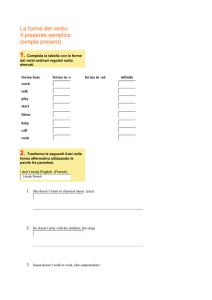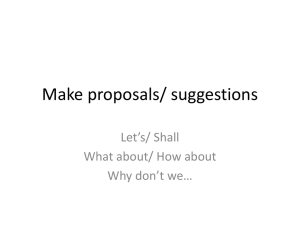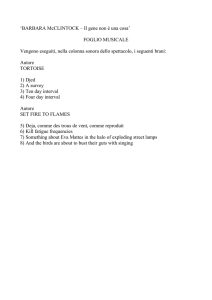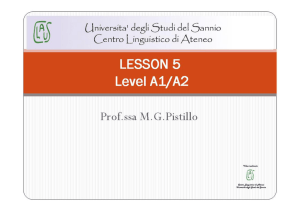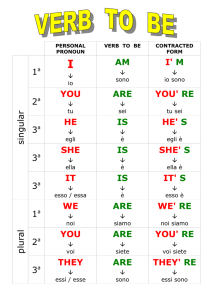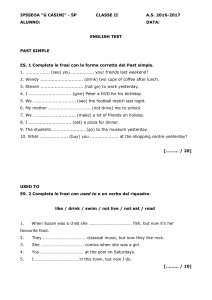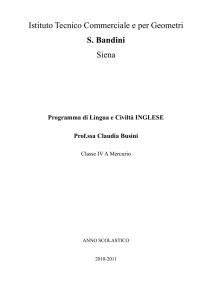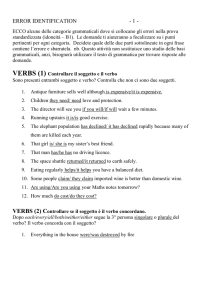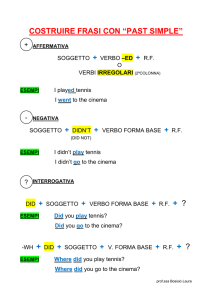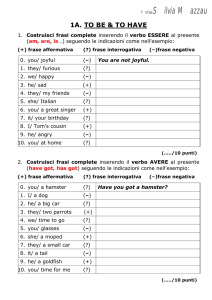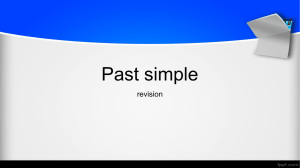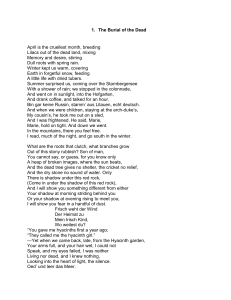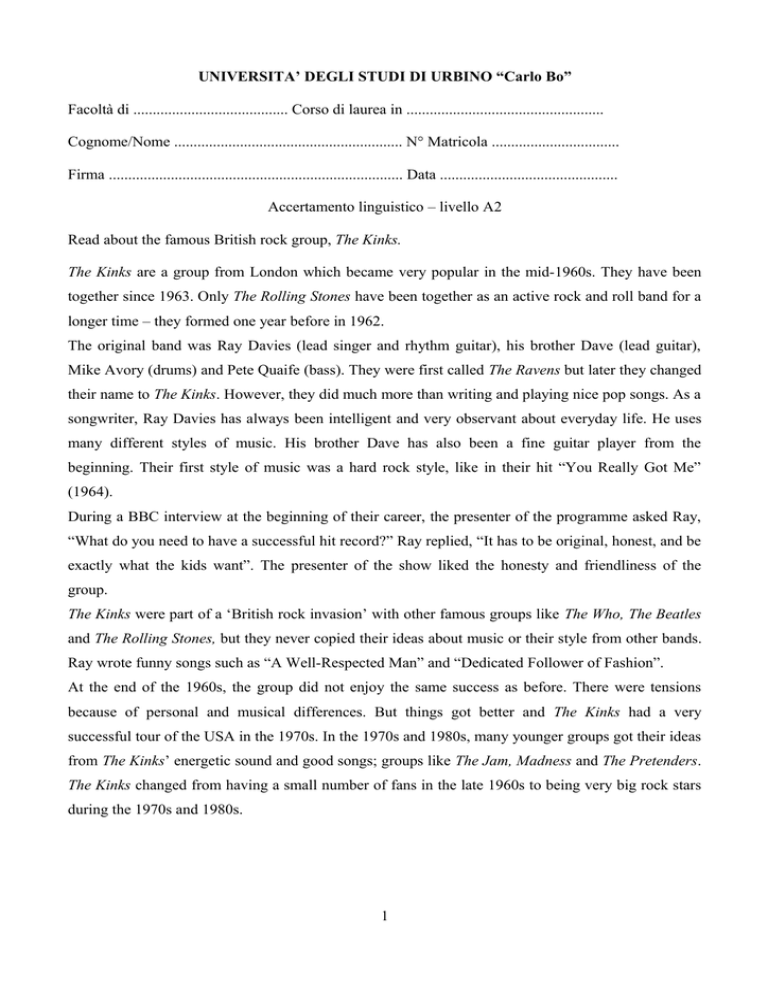
UNIVERSITA’ DEGLI STUDI DI URBINO “Carlo Bo”
Facoltà di ........................................ Corso di laurea in ...................................................
Cognome/Nome ........................................................... N° Matricola .................................
Firma ............................................................................ Data ..............................................
Accertamento linguistico – livello A2
Read about the famous British rock group, The Kinks.
The Kinks are a group from London which became very popular in the mid-1960s. They have been
together since 1963. Only The Rolling Stones have been together as an active rock and roll band for a
longer time – they formed one year before in 1962.
The original band was Ray Davies (lead singer and rhythm guitar), his brother Dave (lead guitar),
Mike Avory (drums) and Pete Quaife (bass). They were first called The Ravens but later they changed
their name to The Kinks. However, they did much more than writing and playing nice pop songs. As a
songwriter, Ray Davies has always been intelligent and very observant about everyday life. He uses
many different styles of music. His brother Dave has also been a fine guitar player from the
beginning. Their first style of music was a hard rock style, like in their hit “You Really Got Me”
(1964).
During a BBC interview at the beginning of their career, the presenter of the programme asked Ray,
“What do you need to have a successful hit record?” Ray replied, “It has to be original, honest, and be
exactly what the kids want”. The presenter of the show liked the honesty and friendliness of the
group.
The Kinks were part of a ‘British rock invasion’ with other famous groups like The Who, The Beatles
and The Rolling Stones, but they never copied their ideas about music or their style from other bands.
Ray wrote funny songs such as “A Well-Respected Man” and “Dedicated Follower of Fashion”.
At the end of the 1960s, the group did not enjoy the same success as before. There were tensions
because of personal and musical differences. But things got better and The Kinks had a very
successful tour of the USA in the 1970s. In the 1970s and 1980s, many younger groups got their ideas
from The Kinks’ energetic sound and good songs; groups like The Jam, Madness and The Pretenders.
The Kinks changed from having a small number of fans in the late 1960s to being very big rock stars
during the 1970s and 1980s.
1
PART 1
Indicare se le seguenti frasi sono vere (true) o false (false):
es. The Kinks are from Liverpool. False
1. The kinks started as a band before The Rolling Stones.
2. The band is still active today.
3. The group was called The Kinks at the beginning.
4. Nearly all their songs sounded the same or similar.
5. They were not friendly to the TV presenter who interviewed them.
6. They learned a lot from other groups.
7. The words of Ray’s songs were not always serious.
8. The group has always been very successful.
9. The members of the group have always remained good friends.
10. Many younger groups were influenced by The Kinks.
PART 2
A. Riempire i vuoti inserendo i verbi fra parentesi nella forma appropriata.
(a) Scegliere fra il Present Simple (es. do/does) e il Present Continuous (es. is/are doing)
1. It ...................................................... (not/rain) very much here in the summer.
2-3. “...........................................................................................(you/leave) now?”
“Yes, I ........................................................(want) to catch the six o’clock train.”
(b) Scegliere fra il Past Simple (es. did) e il Past Continuous (was/were doing)
4-6. “What …………………………………….(you/do) yesterday evening?”
“Nothing. I ………………….. (have) dinner early and then ……………… (go) to bed at 22.30”.
(c) Completare le seguenti frasi scegliendo fra i tempi Past Simple (es. did) e Present Perfect (have
+ past participle) del verbo fra parentesi.
es. We have already seen (see) the film. We saw (see) it last Sunday.
7. David ………………………………….(know) Debbie since they were at school.
8-9. Shakespeare …………….. (to be born) in Stratford, but he…………… (work) in London for
about twenty-five years.
10-11. Paula’s enjoying “Anna Karenina”. She ………………….….. (start) reading it last week, but
she …………………………………… (not/finish) it yet.
2
(d) Completare le frasi scegliendo fra il tempo futuro (will) e il Present Simple del verbo fra
parentesi.
12-13. If I .......................... (have) enough money, I ………………… (buy) a new mobile phone next
week.
(e) Scegliere fra I due tempi future: will e going to.
14-15. ”Can you help me in the garden tomorrow?”
“Sure. I can’t do anything before lunch because I ……………………….. help Sue paint the
bathroom, but I ……………………….. give you a hand in the afternoon.”
(f) Completare le frasi con un verbo difettivo (es. can/would/shall/must ecc.):
16-18. “ .............................................................. I speak to the manager, please?”
“I’m afraid he’s busy at the moment. ……………………. you leave your phone number and I
……………………… ask him to ring you back when he’s free.”
B. Completare le seguenti frasi scegliendo fra it/they/there con la forma appropriata del verbo ‘to
be’. Es. There is a good restaurant in the square; it is quite cheap.
19-20. ……………..……. an umbrella in the bathroom. Whose …………………. ?
C. Completare le frasi con il comparativo o il superlativo dell’aggettivo fra parentesi. Aggiungere
the o than, se necessario.
21.Gold is ………………………………………….. silver. (expensive)
22-23.London is …………………….…………………………………… (large) city in England, but
it isn’t …………………………………..… (beautiful).
D. Completare le frasi scegliendo tra: some/any/much/many/a few/a little
24-25. “How ……………………………..……….. money have we got?”
“Not enough for the weekend. I’ll get ………….…….at the bank this morning.”
E. Inserite a, an o the se lo ritenete opportuno.
26-28. My brother is......... doctor. He lives by............ River Thames in ……..London.
F. Completare le seguenti frasi scegliendo la preposizione giusta.
29-30. Peter has got a dental appointment .............. Bologna ….. ………. Wednesday.
3
Soluzioni
Part 1
1. F
2. T 3. F
4. F
5. F
6. F
7. T 8. F
Part 2
1. does not rain
2. Are you leaving
3. want
4. did you do
5. had
6. went
7. has known
8. was born
9. worked
10. started
11. has not finished
12. have
13. will buy
14. am going to
15. will
16. Can/Could/(Might)
17. Can/Could/Will/Would
18. will/(can)/(could)
19. There is
20. is it
21. more expensive than
22. the largest
23. the most beautiful
24. much
25. some/a little
26. a
27. the
28 29. in
30. on
4
9. F
10. T

